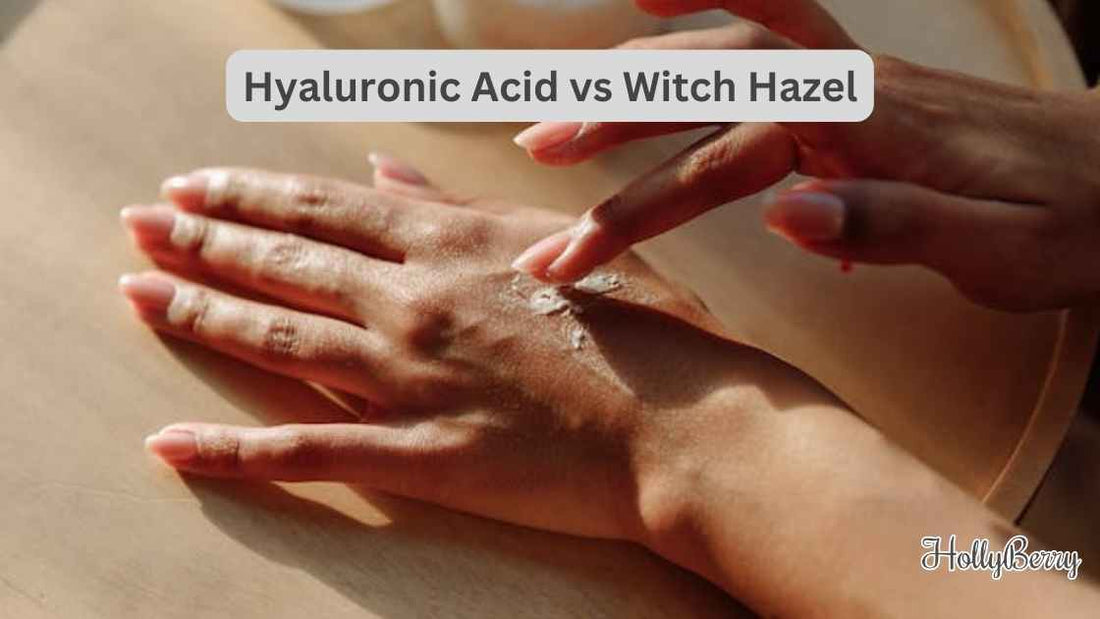
Hyaluronic Acid vs Witch Hazel
Share
Comparing Skincare Benefits

In the quest for optimal skincare, hyaluronic acid and witch hazel present themselves as popular choices, each boasting unique benefits tailored to different skin needs. Hyaluronic acid, a substance naturally occurring in the body, is revered for its unparalleled ability to retain moisture.
Its presence in skincare is marked by the promise of hydrated, plump skin, making it a go-to ingredient for those seeking a youthful and dewy complexion. Hyaluronic acid's main draw lies in its capacity to hold up to 1000 times its weight in water, which translates to profound moisturisation and improved skin texture.
Witch hazel, on the other hand, brings forward its natural heritage as a botanical extract. With a history rooted in traditional medicine, this plant extract is celebrated for its astringent and anti-inflammatory properties.
Commonly used to address acne-prone and oily skin, witch hazel works to tighten skin, reduce oiliness, and soothe inflammation. Those with sensitive skin may find its calming effects particularly beneficial, as it helps to alleviate irritations and redness.
Comparing hyaluronic acid with witch hazel is akin to examining two sides of the same coin; while both serve distinct functions in skincare, they cater to diverse concerns. Hyaluronic acid predominantly tackles dryness and ageing, whereas witch hazel is focused on controlling oil production and combating skin inflammations.
Individually, they offer targeted solutions, yet when used in harmony, they could complement the multi-faceted needs of a comprehensive skincare regime.
Comparing the Properties and Uses of Hyaluronic Acid and Witch Hazel
Order our extra large Hyaluronic acid
In skincare, hyaluronic acid and witch hazel serve distinct functions, with the former being renowned for its hydrating benefits and the latter recognized for its astringent properties.
Hyaluronic Acid: A Hydration Powerhouse
Hyaluronic acid is a high molecular weight polysaccharide and an integral component of the skin's extracellular matrix. It is known for its exceptional capability to retain moisture, where it can hold up to 1000 times its weight in water.
This characteristic makes hyaluronic acid a hydration powerhouse, invaluable for individuals with dry skin or those looking to enhance skin hydration and elasticity. In sensitive skin formulations, its gentle nature ensures compatibility without triggering irritation.
Medical applications of hyaluronic acid are diverse, spanning from intraarticular injections in osteoarthritis to wound healing treatments owing to its involvement in cell differentiation and anti-inflammatory processes.
Witch Hazel: Nature's Astringent
Witch hazel, obtained from the leaves and bark of the Hamamelis plant, is a natural astringent known to tighten pores and refine skin texture. Its tannins contribute to its astringency, making it a common ingredient in toners aimed at reducing oil production and improving skin clarity.
Witch hazel has antioxidant properties, which help in protecting the skin against environmental stressors. Additionally, its anti-inflammatory quality is beneficial for soothing skin, making it a popular choice for treating acne and inflammation. However, due to its astringent nature, those with sensitive skin should use it judiciously to avoid potential irritation.
Skin Care Applications and Considerations
The art of skin care pivots on understanding the unique properties and applications of ingredients such as Hyaluronic Acid and Witch Hazel. This section sheds light on how they serve different skin care needs, from managing oily skin and acne to anti-ageing treatments, and cautions to be heeded for safe application.
Addressing Acne and Oily Skin
Witch Hazel (Hamamelis virginiana) is esteemed for its astringent properties, which aid in controlling acne and oily skin. Dermatologists may recommend Witch Hazel to remove excess sebum, reducing shine and minimising the appearance of pores. As part of a skincare routine, it can be applied before acne treatments containing salicylic acid, to prepare the skin.
-
Common applications for oily, acne-prone skin:
- Toner: After cleansing to tighten pores and regulate oil.
- Spot Treatment: Directly on blemishes to diminish redness and swelling.
Alcohol-free variants are preferred to avoid irritation.
Anti-Ageing and Sensitive Skin Treatments
Hyaluronic Acid stands out in its capacity for moisturising and diminishing fine lines and wrinkles. It functions by retaining water in the skin, promoting a plumped and youthful appearance. This highly efficacious moisturizer and serum ingredient is generally safe for all skin types, including sensitive skin.
-
Key components for sensitive and ageing skin:
- Serums: Incorporate Hyaluronic Acid for deep hydration.
- Creams: Use alongside antioxidants and retinol to support skin elasticity.
Individuals with sensitive skin should opt for products enriched with glycerin, aloe vera, or rose water to enhance soothing effects.
Side Effects and Safety Precautions
Being informed about potential side effects is critical to ensure a safe skincare experience. Witch Hazel may cause irritation or dryness especially if it contains alcohol. Thus, it should be patch-tested before regular use, particularly by those with sensitive skin or conditions like eczema and rosacea.
Conversely, Hyaluronic Acid is typically well-tolerated but could interact with other skincare products. A gentle cleanser should be used prior to application to prevent any unwanted reactions. Individuals using niacinamide or other active ingredients should consult an esthetician or dermatologist to curate a harmonious regimen.

